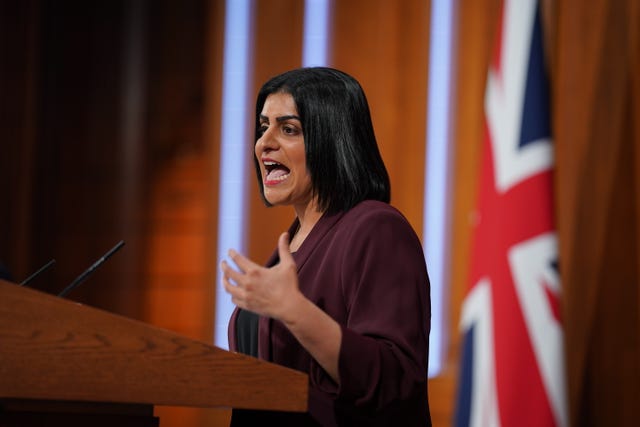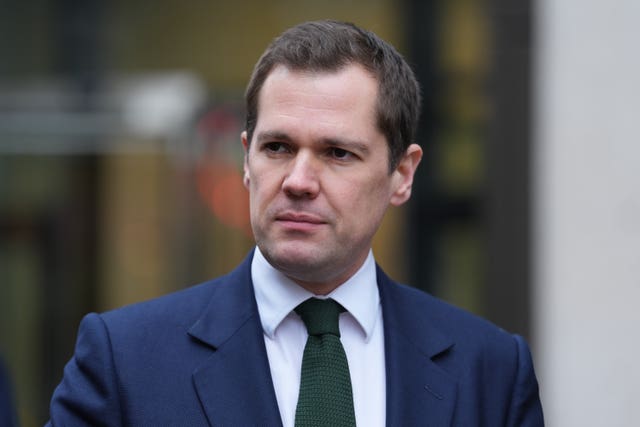Government urged to empower police with more force to bring offenders to court
Justice Secretary Shabana Mahmood said guilty defendants avoiding court was a ‘final insult to victims and their families’.

The Government should give police the power to use more force in compelling offenders to attend sentencing hearings, shadow justice secretary Robert Jenrick has said.
Justice Secretary Shabana Mahmood said guilty defendants avoiding court was a “final insult to victims and their families, because it robs them of the chance to tell offenders through victim impact statements the pain they have caused”.
The Victims and Courts Bill would give courts the power to require offenders to attend their sentencing hearing and states that they commit a criminal contempt if they fail to comply.
It would also automatically restrict parental responsibility rights for child sex offenders and provide information to victims about an offender’s release.
Ms Mahmood said the Bill “marks an important step forward in our mission to rebuild our justice system so that it serves the victims who in recent years, it has all too often failed”.

Mr Jenrick said the Government should “enact the most radical and serious changes” in an effort “to rebalance the criminal justice system in the favour of victims”.
He told MPs: “Officers will not feel safe to force violent offenders out of their cells, not least because the Bill only affords them the use of reasonable force, not the ability to use force as long as it is not grossly disproportionate.
“Surely, that should be the threshold in law.”
Later Conservative MP Sir Ashley Fox (Bridgwater) intervened to say: “Using the test of reasonable force as (Ms Mahmood) proposes raises the unpleasant prospect that prisoners so forced might then bring claims for damages, which would be a further insult to victims and I would firmly support his view that grossly disproportionate is the correct legal test to use.”
Mr Jenrick replied: “Given that the threshold of grossly disproportionate is an available and established concept at law, why not apply it in these circumstances so that we can equip the criminal justice system with the standard that they need to ensure that all by the most exceptional circumstances, these individuals are brought to court, if that is the wish of the victims of crime.”
The shadow justice secretary also highlighted that judges making such orders for offenders to appear at sentencing can take into account “the reasonable excuse of an offender”.
He said: “Surely this should be tightened to the most exceptional circumstances. Where in this Bill is the right of victims’ views to be heard and recorded in court?
“Some victims will want the offender to come before the court, even in the knowledge that it will be highly disruptive, that it will challenge the solemnity of the court, and frankly, behave in a way that many would consider to be deeply shocking and even scarring.
“Surely that should be broadly their choice, or at least that they should be properly consulted by the judge? This legislation is ultimately for the victims.”

Outlining the motives behind the Bill, Ms Mahmood said the Government’s aim was to ensure justice was swift, that prisons did not become full and victims are not traumatised by engaging in the justice system.
She said: “We are reforming sentencing so that our prisons never run out of space again and there is always space inside for dangerous offenders.”
If the Bill passes the victims’ commissioner will have their powers strengthened, including the ability to get information from councils and social housing providers to stop anti-social behaviour.
The Government will also make it easier for the Crown Prosecution Service to recruit prosecutors, who can lead cases against suspected criminals in court, to try and ensure criminal cases move more quickly through the courts, and trials are not delayed.
The Conservatives were among those to urge the Government to toughen up its proposals to automatically withdraw parental responsibility from parents who are guilty of serious sexual assault towards their children.
Shadow justice minister Kieran Mullan welcomed the aim of the policy, but added: “I think this measure is the worst of both worlds. Related to only offences against one’s own children, and quite a high bar of a four-year sentence. I think we can do better.”
Justice minister Alex Davies-Jones indicated further legislation could follow, saying: “The Government has heard the strength of feeling on this issue regarding parental responsibility.
“Our focus must be on automatically restricting parental responsibility for offenders who have committed those serious child sexual abuse offences, the most heinous crimes in society.”
She added: “This is … a novel and untested change to the law. The response from perpetrators is unpredictable so we have currently chosen to focus on the highest harm cases first, because we do not want to have unintended consequences and we need to prioritise all vulnerable children who are going through the family courts.
“However, this is the beginning, as we have said, and we look forward to working constructively across the House on this measure.”
The Bill received an unopposed second reading and will undergo further scrutiny at a later date.





